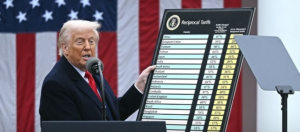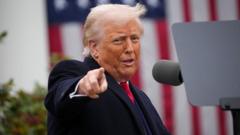US authorities attribute recent hacks—including breaches at the Treasury Department and major telecom firms—to Chinese state-affiliated groups, sparking heightened national security concerns and diplomatic tensions.
Recent Cyber Attacks: Tensions Mount Between US and China Amid Hacking Allegations

Recent Cyber Attacks: Tensions Mount Between US and China Amid Hacking Allegations
A series of alarming cyber attacks linked to Chinese hackers have raised significant concerns among US officials, targeting sensitive government and telecommunications sectors.
Recent reports have unveiled a troubling trend of cyber attacks against US entities, with officials alleging that hackers associated with the Chinese government are behind these incidents. The latest breach, disclosed on Monday, involved the US Department of the Treasury, which labeled the cyber intrusion a "major incident." According to officials, the hackers gained access to employee workstations and unclassified documents. In response to these allegations, China has vehemently denied any involvement.
This breach follows revelations in late October that two major presidential campaigns in the US were also targeted, identified as perpetrated by "actors affiliated with the People's Republic of China," as stated by the FBI and the Cybersecurity and Infrastructure Security Agency (CISA). Prior to this, reports emerged in September indicating a successful compromise of security at several prominent telecommunications companies, with telecom giants AT&T and Verizon among those affected. Notably, earlier in the year, seven Chinese nationals were charged for operating a hacking campaign that spanned at least 14 years, aimed at foreign critics, businesses, and political figures.
Unlike prior isolated incidents, the recent wave of cyber attacks appears to have multiple hacking groups implicated, all linked to Chinese state interests. Security experts have coined various nicknames for these groups; for instance, the one behind the telecom attack is known as Salt Typhoon, while another group, Volt Typhoon, is reported to have targeted critical infrastructure for potential disruption. The charged Chinese individuals were affiliated with an operation referred to as Zirconium or Judgment Panda, which previously attempted to breach UK parliamentary emails.
The latest attacks seem directed toward influential figures, seeking to extract intelligence beneficial to the Chinese government. Targets have included the phones of President-elect Donald Trump, Vice-President-elect JD Vance, and members of Vice-President Kamala Harris's campaign team. Additionally, hackers accessed a law enforcement wiretap database, potentially exposing foreign spies under surveillance. Experts like Richard Forno from the University of Maryland, Baltimore County, note that the objective appears to be extensive data collection.
Bipartisan concern within US legislative circles is palpable. Senator Mark Warner described the activities of Salt Typhoon as "the worst telecom hack in our nation's history," while other officials expressed grave misgivings about the implications of these breaches. Notably, FBI Director Christopher Wray characterized the breaches as China's "most significant cyber-espionage campaign in history," emphasizing the scale of their operations as outpacing all other nations combined.
In response, Western governments are ramping up their countermeasures. Following the allegations, the US government issued a national security warning to China Telecom Americas, allowing the firm a 30-day period to respond before potential repercussions. Earlier, the UK imposed sanctions on individuals and entities tied to the alleged cyber operations.
In contrast, China's foreign ministry has categorically rejected the allegations, asserting that they are "baseless" and lacking proof. Officials repeatedly emphasized China's opposition to any form of hacking, calling on the US to cease what they view as cyber-related smear campaigns against China.
As investigations continue and diplomatic tensions rise, experts, including Forno, suggest these hacking efforts likely stem from a lengthy, strategic approach by China, contrasting with the US's more reactive stance in cybersecurity matters. The implications of this cyber warfare extend beyond immediate threats, presenting a formidable challenge to national security and international relations moving forward.























